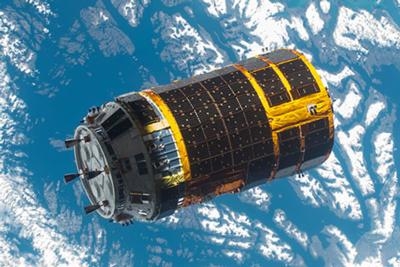Wed, Jun 05, 2019
The Spacecraft Will Provide Supplies To The Kibo Japanese Experiment Module And The International Space Station For Future Servicing Missions
Sierra Nevada Corporation (SNC), has teamed with the Marubun Corporation of Tokyo, Japan and has been awarded a contract to supply critical hardware for Japan’s HTV-X cargo spacecraft.

HTV-X is the advanced version of H-II Transfer Vehicle (HTV) (pictured). The spacecraft will provide supplies to the Kibo Japanese Experiment Module and the International Space Station for future servicing missions.
The HTV-X spacecraft is developed and operated by the Japanese Aerospace Exploration Agency (JAXA), with primary sections of the vehicle being manufactured by Mitsubishi Heavy Industries (MHI) and Mitsubishi Electric Corporation (MELCO).
“SNC is proud to service the space station in any capacity, and our services for the HTV-X vehicle show a great partnership between international and U.S. companies. We are happy to help with any space exploration and science in low-Earth orbit,” said Bryan Helgesen, senior director business development for SNC’s Space Systems business area.
SNC has provided thousands of devices on hundreds of space missions for more than three decades, including more than eight sets of HTV cargo pallet restraint mechanisms, and more than 15 sets of CYGNUS cargo vehicle Passive Common Berthing Mechanisms and External / Visual Ranging Cue systems. For HTV-X, SNC will be able to leverage this extensive flight heritage and once again supply multiple key technologies.
HTV-X Mission Hardware Highlights:
HTV-X External / Visual Ranging Cue System:
- Navigation lights activated on-orbit and prior to robotic arm deployment to assist in guiding the vehicle safely berth it to the space station.
- Passive Common Berthing Mechanism:
- The PCBM is a mechanical and structural interface required to safely and reliably attach a spacecraft to the space station.
Hatch Kit:
- Allows astronauts to enter the vehicle and retrieve critical supplies, payloads and experiments.
Internal lighting system:
- State-of-the-art solid-state lighting technology used to provide efficient mass and power solutions for navigation, crew and astronaut task lighting. This new technology replaces outdated fluorescent tubes.
Cabin pressure sensor:
- Unique sensor design suitable for the rigors of space flight while maintaining precision accuracy in monitoring atmospheric pressure inside the pressurized spacecraft (or HTV-X Cargo vehicle).
HTV-X exact launch dates are still to be determined.
(Source: Sierra Nevada Corporation news release. H-II Transfer Vehicle pictured in JAXA image)
More News
He Attempted To Restart The Engine Three Times. On The Third Restart Attempt, He Noticed That Flames Were Coming Out From The Right Wing Near The Fuel Cap Analysis: The pilot repor>[...]
Make Sure You NEVER Miss A New Story From Aero-News Network Do you ever feel like you never see posts from a certain person or page on Facebook or Instagram? Here’s how you c>[...]
From 2009 (YouTube Edition): Leading Air Show Performers Give Their Best Advice for Newcomers On December 6th through December 9th, the Paris Las Vegas Hotel hosted over 1,500 air >[...]
Aero Linx: NASA ASRS ASRS captures confidential reports, analyzes the resulting aviation safety data, and disseminates vital information to the aviation community. The ASRS is an i>[...]
“For our inaugural Pylon Racing Seminar in Roswell, we were thrilled to certify 60 pilots across our six closed-course pylon race classes. Not only did this year’s PRS >[...]
 NTSB Final Report: Rutan Long-EZ
NTSB Final Report: Rutan Long-EZ ANN FAQ: Turn On Post Notifications
ANN FAQ: Turn On Post Notifications Classic Aero-TV: ICAS Perspectives - Advice for New Air Show Performers
Classic Aero-TV: ICAS Perspectives - Advice for New Air Show Performers ANN's Daily Aero-Linx (06.28.25)
ANN's Daily Aero-Linx (06.28.25) Aero-News: Quote of the Day (06.28.25)
Aero-News: Quote of the Day (06.28.25)



